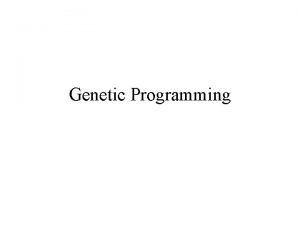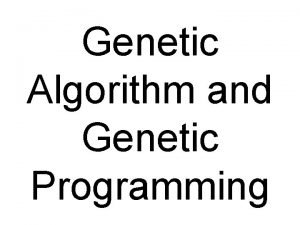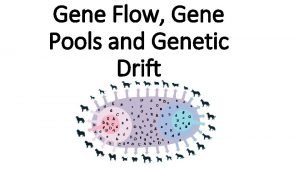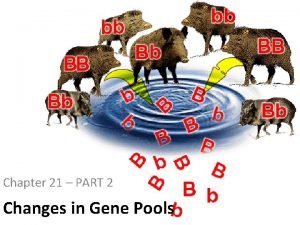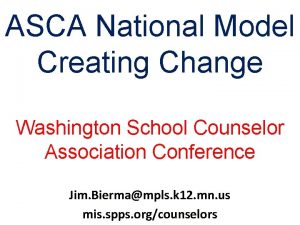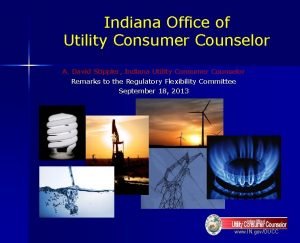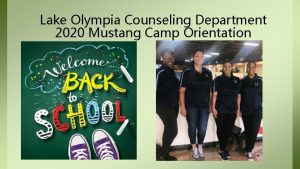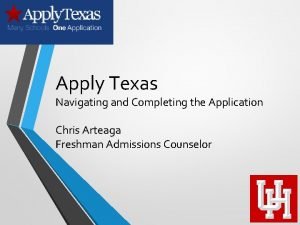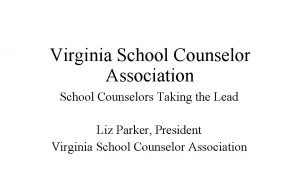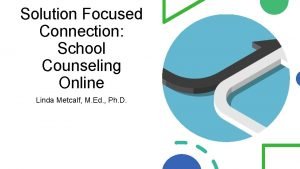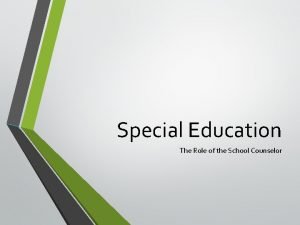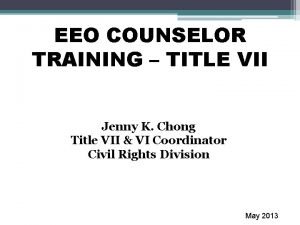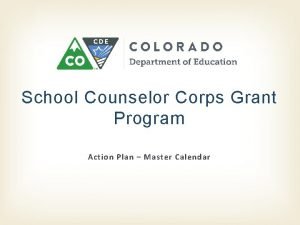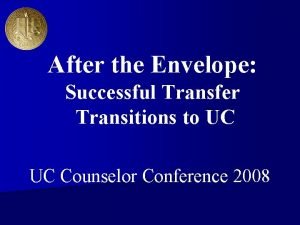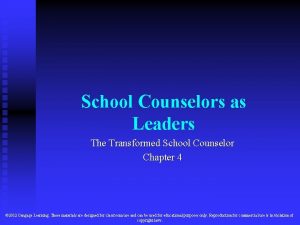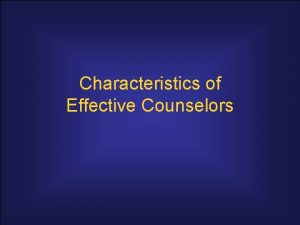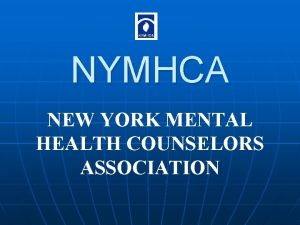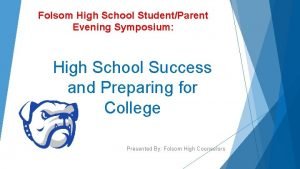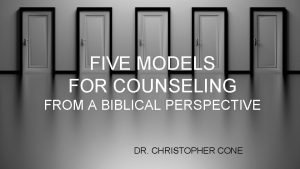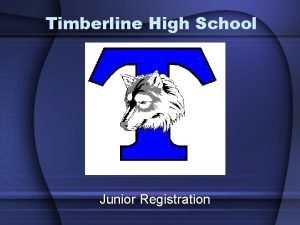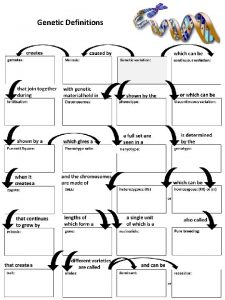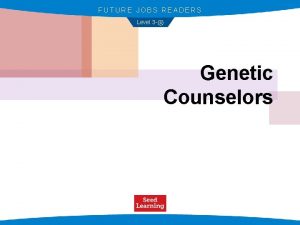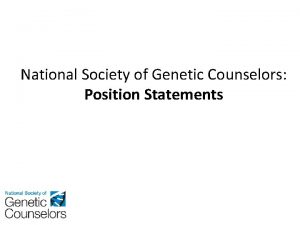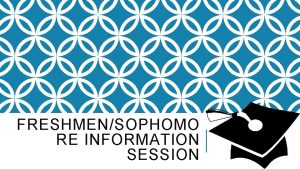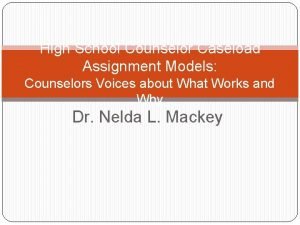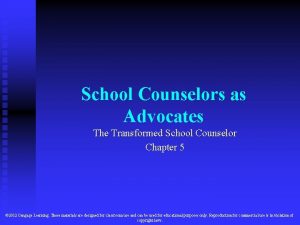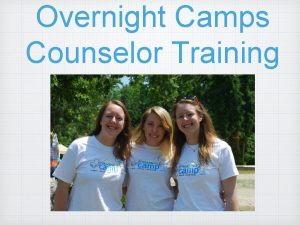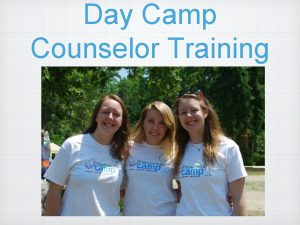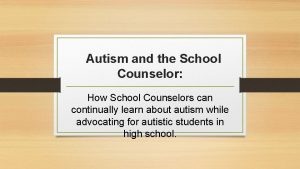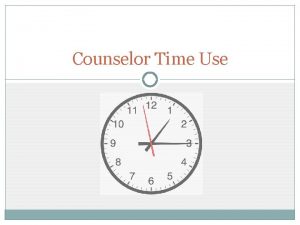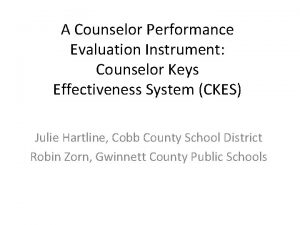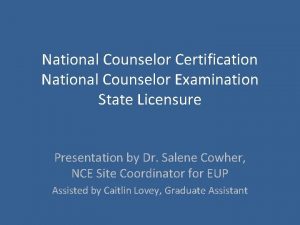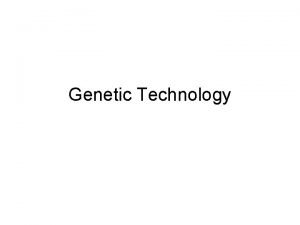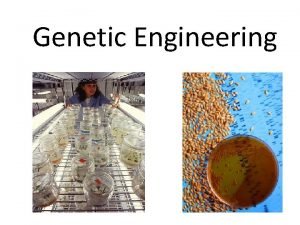What is a Genetic Counselor Genetic counselors are

































































- Slides: 65


What is a Genetic Counselor?

Genetic counselors are specialists who provide personalized help about your genetic health.

What is a Genetic Counselor?

What is a Genetic Counselor?

What is a Genetic Counselor? I provide information and support. I am a genetics expert. I am a family advocate. I am a translator of genetic information.

Genetic counselors work in a variety of settings.

Specialty Areas The largest specialty areas for genetic counselors are cancer, prenatal and pediatric genetics, but genetic counselors work in a variety of specialties.

What do genetic counselors do? ● Help you understand your genetic risks based on your family history ● Help develop a personalized medical plan ● Enable you to make an informed decision about genetic testing ● Explain results and help you process the medical and emotional implications ● Connect you to resources, support groups, or other patients

Reasons to See a Genetic Counselor • You are pregnant or considering pregnancy and have questions about your baby inheriting a condition • You, your child or a family member has been diagnosed with a genetic condition, or there is concern for a genetic condition • Your or a family member have unexplained medical concerns that could be due to genetic causes

Common Diseases that May Have a Genetic Component • Cancer • Heart disease • Diabetes • Hypertension • Stroke • Alzheimer's • Arthritis • Osteoporosis

Preparing for your visit with a Genetic Counselor • Family health history • Medical records • Results of any genetic tests • A list of your questions and concerns

What happens during a genetic counseling appointment? • Genetic counselors ask about your family health history, discuss genetic risks and testing options and support you • Talk about any appropriate options in terms of genetic testing and medical management • Help you understand available tests and possible results, and help you decide when and if to pursue genetic testing

How much does genetic counseling cost? ● Health insurance typically pays for genetic counseling and in many cases pays for genetic testing when it is recommended by a doctor ● Check with your insurance company to verify coverage

Explore a Career as a Genetic Counselor

There are so many reasons to become a Genetic Counselor.

Genetic Counselor was named one of the “ 25 Amazing Healthcare Support Jobs” and one of the “ 100 Best Jobs” in 2019. - U. S. News and World Report

By the Numbers… Employment of genetic counselors is projected to grow 29% from 2016 -2026. Average growth is 7%. -Bureau of Labor Statistics The average salary for a full-time genetic counselor in 2018 was $91, 318 and ranges up to $247, 000 depending on specialty area and experience. – NSGC 2019 Professional Status Survey More than 87% of graduating GCs in 2016 and 2017 had accepted a position before graduation. - NSGC 2018 Professional Status Survey 91% of genetic counselors report they are satisfied with their job. – NSGC 2018 Professional Status Survey

The Education Path A bachelor’s degree, typically in: • biology • social science • or a related field A master’s degree in genetic counseling from an accredited program: • coursework • clinical training • research ABGC and/or ABGCC Certification (USA & Canada) after passing the Board Examination. Many states also require licensure to practice.

Genetic Counseling Program Coursework • Human genetics • Embryology • Ethics • Counseling techniques • Genetic tests

Interested in Applying to a Genetic Counseling Program? For tips and information, visit the Association of Genetic Counseling Program Directors https: //agcpd. org/Admissions. Info

A Range of Career Possibilities • Working with patients • Laboratories • Research • Academia • Professional and patient organizations • Healthcare administration • Public health • Policy

A Range of Career Possibilities Any role you can imagine and create for yourself “As a genetic counselor, I've had the opportunity to work in many different areas of medicine. And the impact I've had over the course of those years…. has been as an advocate for patients. ” -Janet Williams, CGC

Why and when should I refer to a Genetic Counselor? “Working with a genetic counselor can fill in the gaps between offering genetic testing and making sure a patient receives appropriate discussion about testing, implications of genetic testing and when it is necessary [to help test] other family members. ” — Doctor, Vascular Medicine

Why work with a Genetic Counselor? • Increase patient satisfaction • Make informed decisions • Save time and money “I learned a lot myself from the genetic counselor progress notes about next steps in treatment and workup, and my patients are reassured by having greater understanding of the test results. ” — Doctor, Family Practice

Prenatal Indications for Genetic Counseling • • • Mother will be 35 years or older at time of delivery (singleton) Mother will be 33 years or older at time of delivery (twins) Consanguineous union Abnormal first or second trimester maternal screening Exposure to known or potential teratogen Fetal anomaly/anomalies • • • Positive carrier screen for genetic condition Personal history of stillbirths, previous child with hydrops or SIDS, recurrent pregnancy losses Either partner with a family history of birth defects, chromosomal anomalies, potentially genetic hearing/vision loss, intellectual disability or autism

Oncological (Cancer) Indications for Genetic Counseling • • Personal or family history of cancer(s) known to be associated with specific genes or mutations, such as: – – – – Breast Ovarian Colorectal Uterine Pancreatic Gastric Neuroendocrine Metastatic prostate cancer This should be considered in the context of: – – • A compelling family history Young age at onset Bilateral lesions And/or familial clustering of related tumors Any child with a solid tumor

Pediatric Indications for Genetic Counseling Newborn/Infant • • • Abnormal newborn screening results Born to a parent with a known chromosomal abnormality or rearrangement (balanced or unbalanced) A single major, or multiple major and/or minor anomalies Dysmorphic features Hypotonia or hypertonia Failure to thrive • • A known metabolic disorder or symptoms of a metabolic disorder (e. g. , intractable seizures, hepatosplenomegaly, acidosis, cyclic vomiting, persistent hypoglycemia, developmental regression, and unusual body odor) Abnormal brain MRI findings (e. g. , leukodystrophy, periventricular calcifications, unidentified bright objects, or a malformation)

Pediatric Indications for Genetic Counseling - Childhood • • Autism or pervasive developmental disorder Unusual behaviors, especially when associated with minor malformations and developmental delay Unexplained intellectual disability or global developmental disorder An unusual growth pattern such as overgrowth, short stature, or hemihypertrophy • Evidence of a connective tissue disorder (e. g. , extreme joint laxity, poor wound healing, or a marfanoid habitus) • Congenital eye defects or blindness associated with problems (e. g. , microphthalmia, cataracts, megalocornea, retinitis pigmentosa, or cone-rod dystrophy)

Pediatric/Adult Indications for Genetic Counseling • • A recognized or suspected genetic syndrome, including a chromosomal or single gene disorder A significant family history of medical or psychiatric conditions that puts the patient at risk of developing the same or similar condition Unusual skin findings (e. g. , multiple types of lesions, multiple lipomas, numerous hypo or hyperpigmented lesions, and albinism) Problems with clotting, including disorders such as hemophilia and thrombophilia

Pediatric/Adult Indications for Genetic Counseling • Progressive muscle weakness that might be associated with a genetic disorder (e. g. , a form of muscular dystrophy, spinal muscular atrophy, or myotonic dystrophy) • Other neurologic condition that might be associated with a genetic predisposition (e. g. , peripheral neuropathy, unexplained myopathy, progressive ataxia, or any progressive neurologic disorder without a clear, nongenetic cause) • An immunodeficiency or significant immune problem • Cardiomyopathy not secondary to a viral infection

Case Studies

Family History Pedigree: also called a “family tree”; a tool genetic counselors use to visualize a family health history and identify recognizable patterns Pedigree created using http: //www. progenygenetics. com/online-pedigree/

Cancer Genetics

Meet Mary • 45 -year-old woman recently diagnosed with breast cancer • Family history of cancer, including a mother with ovarian cancer who passed away at 70 • Especially concerned about risks for her daughters (ages 22 and 25)

Mary’s Family History

Hereditary Breast Cancers • • • Around 10 -15% of all breast cancers are hereditary People with alterations in the genes BRCA 1 or BRCA 2 have greatly elevated chances to develop certain cancers, especially female breast (up to 85% risk) and ovarian (up to 45% risk) Other features may include: – Multiple affected individuals – Younger age of onset – Affected individuals may have: • bilateral breast cancer and/or triple negative breast cancer • multiple primary cancers which may include breast, ovarian, male breast, pancreatic, prostate, or melanoma cancers

In Mary’s Case • She elected to undergo genetic testing • A BRCA 1 alteration was identified, confirming a diagnosis of hereditary breast and ovarian cancer syndrome (HBOC) • Changed Mary’s medical management, including more screening and options for surgery and medications to reduce risks • Allowed for testing of at-risk family members and early intervention in those with the same pathogenic variant

Meet Joe • 45 -year-old male recently diagnosed with colon cancer • Family history of cancer, including a mother with uterine cancer who passed away at 50, a sister who had precancerous colon polyps, and a maternal uncle who had colon cancer at age 47 • Especially concerned about risks for his daughters (ages 22 and 25)

Joe’s Family History

Hereditary Colorectal Cancers • • Around 10% of all colorectal cancers are hereditary – Of those, the majority are due to Lynch syndrome caused by alterations in the MLH 1, MSH 2, MSH 6, PMS 2, or EPCAM genes. People with Lynch syndrome have greatly elevated chances to develop certain cancers, especially colorectal, uterine, ovarian, gastric, and a few others Other features may include: – Younger age of onset – Precancerous colon polyps Individuals at high risk for colon cancer can significantly decrease this risk by having more frequent colonoscopies, beginning at a younger age

In Joe’s Case • Joe elected to undergo genetic testing • An alteration in MSH 2 was identified, confirming a diagnosis of Lynch syndrome • Changed Joe’s medical management, including more screening and options for surgery • Allowed for testing for at-risk family members and early intervention in those who also inherited the MSH 2 alteration

Pediatric Genetics

In Pediatric Genetics • 4 -year-old boy, David, comes to clinic due to short stature, developmental delay and an insatiable appetite • Parents remark that he was very “floppy” as a baby • The geneticist and genetic counselor immediately suspect a diagnosis, and counsel the family about testing options

Prader-Willi Syndrome • Rare genetic condition affecting ~1/30, 000 people • Majority of cases are sporadic • Recommended treatment includes growth hormone therapy • Very specific genetic testing indicated, which may not be understood by a healthcare practitioner outside of genetics • Parents elect testing, which returns positive and David is diagnosed with Prader-Willi syndrome

Prenatal Genetics

Meet Ann • 39 -year-old woman, 13 weeks pregnant Ann underwent prental screening through her OB/Gyn and was referred to genetic counselor to discuss her screening results

During the Appointment • Ann’s genetic counselor explained that her prenatal screening results indicated that her pregnancy had a higher chance of being affected with Down syndrome • Test revealed a 1/50 chance • Ann discussed these results with her genetic counselor as well as possible next steps, which could include a diagnostic procedure (such as amniocentesis) for a prenatal diagnosis

Moving Forward • After meeting with her genetic counselor, Ann decided to undergo an amnioscentesis, a diagnostic tests, which indicated a high risk for trisomy 21, or Down syndrome, in her pregnancy • Ann can use the information from the amnioscentesis to discuss with her doctor whether she should elect to deliver at a high-risk hospital and to prepare herself and her family members for the arrival of the baby

Cardiac Genetics

Meet William • A 50 -year-old man comes to clinic after an echocardiogram revealed he had an enlarged aorta • He had heard that some type of heart condition affected his relatives, but he hadn’t realized he could be at risk since he felt healthy • Now, he would like to learn more about his personal and family’s risks

William’s Initial Family History

William’s Family History After Genetic Counseling

During the Appointment • We learned that his two deceased siblings had both passed away due to major medical problems with their aortas • These events had been explained away due to pregnancy or drowning, so the emerging pattern was not immediately clear • William was offered genetic testing for heritable thoracic aortic disease

Moving Forward • William can work with his genetic couselor and family to determine whether he wants to pursue testing • A positive test could allow his children to obtain testing themselves and obtain proper screening and medical care

General Genetics

Meet Gianna • A 28 -year-old woman, Gianna, comes to General Genetics clinic, with a history of chronic pain • She had been to many other doctors’ appointments, and had been told that her symptoms were likely psychiatric • Gianna also has a history of depression and anxiety Many “chronic pain” cases do not have a genetic explanation, however •

During the appointment. . . • Genetic counselor asks for full, detailed history of pain, and Gianna explains she has severe stomach pain, and she often feels like hands and feet are burning or tingling • The genetic counselor reviews medical records, and notices that in a routine urine test, Gianna was noted to have protein in her urine Gianna was adopted, and does not know any health information about her biological family •

Gianna’s Diagnosis • Gianna is offered testing for Fabry disease, which confirms her diagnosis • This condition has treatment, which helps Gianna’s symptoms improve • Her diagnostic information can also be used for family planning, if Gianna is considering pregnancy

Moving Forward • Gianna’s genetic counselor gives her a flyer for a national Fabry support group, which she joins and meets other people with the same condition • She is started on enzyme replacement therapy infusions every other week, which improves her symptoms • Gianna is grateful that her genetic counselor took her concerns seriously, listened to her story and advocated for her

Laboratory

In a Genetic Testing Laboratory ● Phone call from a physician at a high-risk breast cancer clinic ● Patient is 52 -year-old woman, who has never had cancer ● She had genetic testing 4 years ago at another doctor’s office, which revealed a variant of uncertain significance (VUS) in a gene called BRCA 1

In a Genetic Testing Laboratory ● Family history: Patient’s mother was diagnosed with breast cancer at 55, sister diagnosed with breast cancer at 45 ● Physician calls the lab to speak with a genetic counselor, and asks if additional genetic testing is necessary

During the Phone Call • Laboratory genetic counselor notes that a previously-reported variant of unknows significance (VUS) has now been reclassified as a “pathogenic variant” • There are established medical guidelines to guide medical management, such as additional surveillance or surgery • In addition, now specific testing may be offered to other, at-risk family members

 Antigentest åre
Antigentest åre Genetic programming vs genetic algorithm
Genetic programming vs genetic algorithm Genetic programming vs genetic algorithm
Genetic programming vs genetic algorithm What is the difference between genetic drift and gene flow
What is the difference between genetic drift and gene flow Gene flow vs genetic drift
Gene flow vs genetic drift Genetic drift vs genetic flow
Genetic drift vs genetic flow School counselor roles
School counselor roles Housing counselor certification
Housing counselor certification Mt sac counselor appointment
Mt sac counselor appointment Counselor roles and responsibilities
Counselor roles and responsibilities School counselor evaluation rubric
School counselor evaluation rubric Washington school counselor association
Washington school counselor association Youth activities counselor disney cruise line salary
Youth activities counselor disney cruise line salary Culturally competent counselor
Culturally competent counselor Uci admissions office
Uci admissions office Imath as
Imath as Ucla login
Ucla login Indiana office of utility consumer counselor
Indiana office of utility consumer counselor Skyward hartlake
Skyward hartlake Myapplytexas
Myapplytexas Virginia school counselors association
Virginia school counselors association English unit 13
English unit 13 Shine counselor
Shine counselor School counselor roles
School counselor roles Special education counselor
Special education counselor Eeo counselor training
Eeo counselor training Coffee with the counselor
Coffee with the counselor School counselor and principal relationship
School counselor and principal relationship School counselor corps grant
School counselor corps grant Missouri school counselor association
Missouri school counselor association Uc counselor conference
Uc counselor conference The transformed school counselor
The transformed school counselor Ics academic advisor
Ics academic advisor Developmental classroom guidance specialist as a counselor
Developmental classroom guidance specialist as a counselor Characteristics of a good counsellor
Characteristics of a good counsellor Woodstock high school counselors
Woodstock high school counselors Sdsu eop counselors
Sdsu eop counselors New york mental health counselors association
New york mental health counselors association Bellaire high school counselors
Bellaire high school counselors What is a mandated reporter
What is a mandated reporter Lambert high school counseling
Lambert high school counseling South forsyth high school counselors
South forsyth high school counselors Lemoore high school counselors
Lemoore high school counselors Olympic heights guidance counselors
Olympic heights guidance counselors Bowie high school counselors
Bowie high school counselors Folsom high school website
Folsom high school website Casteel high school counselors
Casteel high school counselors Basha high school counselors
Basha high school counselors Naviance humble isd
Naviance humble isd Metea valley counselors
Metea valley counselors Slu admissions counselors
Slu admissions counselors Klein cain counselors
Klein cain counselors Brooklyn tech orientation
Brooklyn tech orientation Windermere high school guidance counselors
Windermere high school guidance counselors Lake highlands high school counselors
Lake highlands high school counselors Newport bsd
Newport bsd Olympian high school counselors
Olympian high school counselors Sammamish high school course catalog
Sammamish high school course catalog Elkins course selection
Elkins course selection Bsd405 interlake
Bsd405 interlake Atascocita high school counselors
Atascocita high school counselors Waukegan high school counselors
Waukegan high school counselors Nanc counseling
Nanc counseling Hightower high school counselors
Hightower high school counselors Nanc counselors near me
Nanc counselors near me Timberline high school counselors
Timberline high school counselors

